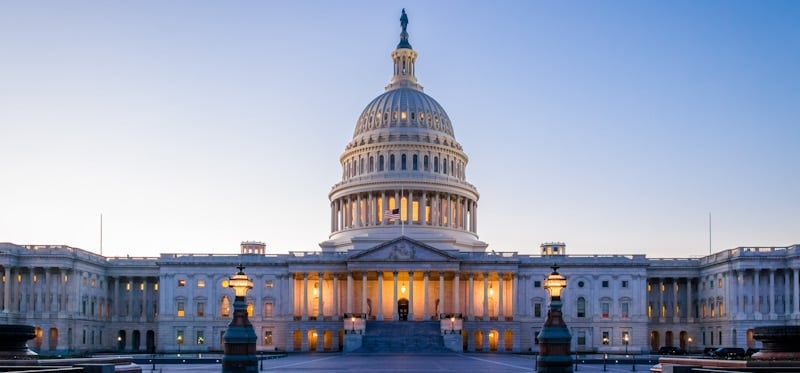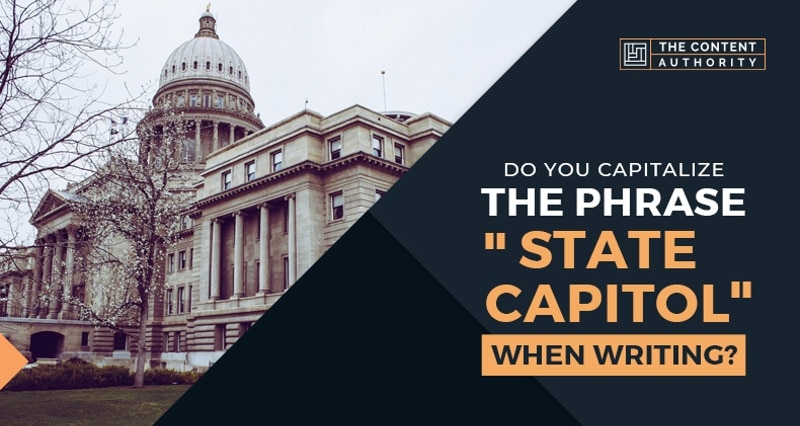A state capitol is a place where important laws are made and brought into effect. These offices of administration have tremendous significance, which should appropriately reflect when discussing state capitals in general. So, should you capitalize the phrase “state capitol”?
The phrase “state capitol” is capitalized when it is used as a proper noun or a name in a sentence. If used as a general noun or the term doesn’t denote anything in particular – for instance, a building – it’s written in lowercase. Similar is the case when using the word “capitol” in your writings.
Continue reading to learn more about the phrase “state capitol”, the difference between the two terms “capitol” and “capital”, and lots more.

What is “Capitol”?
The term “capitol”, as mentioned above, denotes a particular building wherein laws are made. The term has two specific definitions (within the U.S.). It could mean:
- A state legislature building, or
- The Capitol building located in Washington, D.C.
There are multiple capitol buildings in the United States. However, when a sentence is only using the word “capitol”, it’s referring to the United States Capitol or the capitol building in the capital city, which is also commonly referred to as the Capitol Building.
By the way, the United States isn’t the only country to have state capitols or capitol buildings. Some other countries such as Columbia, Venezuela, and Cuba too have capitols. A “capitol” may not be called so or have a different name in most other countries. For example, in countries like Canada, Norway, and Kenya, capitols or legislative buildings are called parliaments.
In America, laws get approved in the Capitol. The Palace of Westminster assumes those responsibilities in the United Kingdom. The Parliament House passes laws in Australia.
What is “Capital”?
The term “capital” has multiple meanings. The actual meaning it adopts depends on the context in which the term is being used. A common interpretation of the word is “a town or city that serves as a government’s official seat in a state or country” – as in “capital city”.
In the business world, “capital” means the funds invested in a company by an individual, corporation, firm, etc. In general, “capital” also means “highly important” or “principal”. For example, “Their capital concern was safety.” Using the word “capital” to mark something as “first-rate”, “excellent”, or “really important” is usually the British way of saying things.
Not to mention, “capital” could also mean writing in uppercase (capital letters). Also, “capital” could be used as an adjective or noun. When used as a noun, it means “wealth and resources” or “a government seat”. It means “excellent” or “first” when used as an adjective.
Example Sentences with the Word “Capital”
The following are sentences incorporating the word “capital”, illustrating the diverse avatars the word can take in various writing scenarios:
- The word “February” always uses the capital “F”.
- Tony has always spoken vehemently against capital punishment.
- The company saw a spike in its capital gains during the previous quarter.
- Tom’s capital offense was his reluctance to apologize.
- According to many, “Troilus and Cressida” is not Shakespeare’s capital work by any stretch of the imagination.
- After accumulating enough capital, she will most likely wet her feet in the world of shares and investing.
- Writing in all capitals could mean you are angry or shouting.
- Rome is the capital city of Italy.
- She needs a lot of fresh capital to revive her business.
“Capitol” and “Capital”: Differentiating the Two
The terms “capital” and “capitol” are homophones, which means the two words have almost identical spellings and the same pronunciations but different origins and meanings. The two terms could not mean more different.
Both the terms are derived from “caput”, a Latin term, which means “head”. Capital evolved from “capitale” (wealth) and “capitalis” (of the head), which is the adjective variant of “caput”.
Capitol has its roots in the term “Capitolium”, a name of a temple. The temple is dedicated to Jupiter, the Greek god Zeus’ Roman equivalent. Since the word “capital” has its roots in multiple Latin terms, its meanings are manifold.
Trying to Remember Which Word Means What

With just a single letter setting the two terms apart, many could easily confuse the two. And the fact that the two words are commonly used when discussing a government or politics does not help, either.
If you are having trouble remembering which term denotes what, this mnemonic trick might help. In other words, take into account the significance of “o” in the word “capitol”. The letter “o” has just one definition.
The letter “a” in capital, on the other hand, has multiple meanings. This should make it easy to remember which term mean what. If that doesn’t work, try to associate the letter “o” in the word “capitol” with the U.S. Capitol building’s spherical dome.
Long story short, Washington D.C. is America’s capital, but the Congress comes together for meetings in the U.S. Capitol building. If you aren’t talking about buildings, the word to use is “capital”.
Knowing the difference between the two nouns may be straightforward for many, but it could still be tricky for quite a few. It’s imperative for the confused folks to tell the two apart as using them incorrectly or interchangeably could sabotage or completely alter the meaning of any sentence.
What is the “State Capitol”?
A state capitol is the capitol building belonging to a particular state. The structure usually contains the House of Representatives, Senate, lieutenant governor’s office, and the treasury department. The elected officials head to their respective state capitols to create laws and govern.
Each state has its capitol. Alabama State Capitol, Alaska State Capitol, California State Capitol, Kentucky State Capitol, Maine State House, Ohio Statehouse, etc., are capitol buildings of their respective states. A citizen’s right to representation and free speech is exercised in these state capitols.
State capitol buildings may have a characteristic design, but they do not look the same. Also, some facilities could be truly expansive. For example, Washington has not just one capitol structure but multiple buildings situated in a group of campuses and parks. They serve as venues for a range of public activities.
Besides serving as workplaces, state capitols are also viewed as cultural and architectural treasures and statehood symbols. This means the state is under no obligation whatsoever to share their capitols freely or offer the public easy access to enjoy and appreciate the structures.
Capitalization Rules for “State Capitol”
The phrase “state capitol” is usually not written in capital letters if it does not denote any specific building. However, some writers chose to capitalize the two words in their writings even if it’s not indicating any particular structure.
Though capitalizing “state capitols” in sentences without there being a direct reference to anything specific cannot be deemed incorrect, it is usually not the right practice.
But since it is not that easy to differentiate between when is it okay to capitalize “state capitol” and when it is not, even people who claim to be knowledgeable or are aware of the fallacy could end up making the error.
An easy trick to avoid confusion is remembering that “capital” refers to a city or town, and “capitol” denotes a building. Also, “capitol” may or may not be capitalized in writings, but “capital” is seldom capitalized.
Example Sentences Using the Phrase “State Capitol”
Here is a list of sentences with the phrase “state capitol” in them and the capitalization variances:
- There are several state capitols in the country.
- Different state capitol buildings have different designs.
- She has been to the Texas State Capitol.
- The state capitol building was completed in 1903.
- The primary structures in the city are the Federal Building, the Country Court House, and the State Capitol.
- The State Capitol, made of native marble and granite, is no doubt an imposing structure.
- Among the several public buildings, the newly-built State Capitol is the finest.
- It is Illinois’ fourth state capitol and the second built in Springfield.
- The State Capitol, built in 1857, is the principal building in the square of several acres.
- The Texas State Capitol has a 318 ft. dome.
- Vermont, despite being the second sparsely populated state in the country, has a state capitol building.
- The library in the State Capitol has close to 150,000 volumes
- The State Capitol is in the 8-acre square, and it has a 240-ft dome and a central tower.

The following are a few sentences with just the word “capitol”:
- The Capitol was made in 1905 and cost more than $2,000,000.
- The Capitol Square also has Henry Clay’s marble statue.
- The streets are broad and well-made, and there are 16 public parks – three of which, Lakeview, East Lake, and Capitol, are especially attractive.
- Capitol Records were not happy with the first set of recordings and wanted more crossover potential.
- Pictures of the Capitol from the mall have beautifully captured the iconic dome.
- Built in 1860; the castle is believed to be on a Roman capitol site.
When not referring to a state building, the noun “capitol” could denote other things in general, as the sentences above clearly illustrate.
Conclusion
To conclude, if you are using the phrase “state capitol” to denote a particular building, capitalize the term. But if you are using the words generally, keep it in lowercase. And if you are discussing a city or town that serves as a seat, it’s “capital” and not “capitol” or “state capitol”.
Shawn Manaher is the founder and CEO of The Content Authority. He’s one part content manager, one part writing ninja organizer, and two parts leader of top content creators. You don’t even want to know what he calls pancakes.

